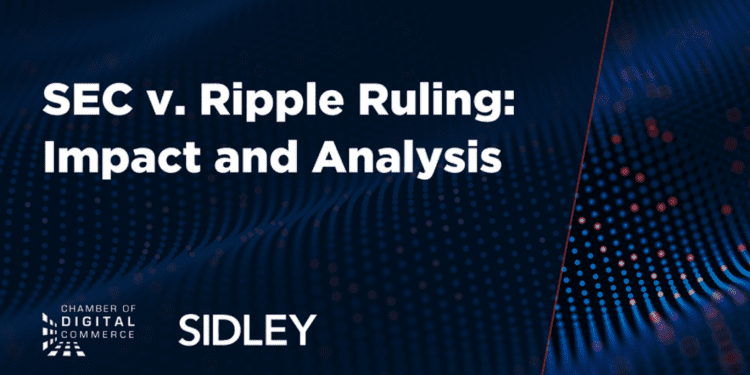- The SEC v. Ripple ruling has been thoroughly studied by CDC in a report dubbed “Impact and Analysis.”
- In the report released on 1st of August, 2023, CDC is mostly pleased with the outcome, noting that the judge applied correct methodology.
- This ruling is expected to set precedents in the crypto currency sector, in the wake of SEC’s legal onslaught in the sector.
The U.S. Securities and Exchange Commission (SEC) lawsuit against Ripple was the subject of a thorough study published on August 1 by the Chamber of Digital Commerce (CDC), a well-known blockchain and digital asset advocacy group in the country. The issue before the court was whether or not the distribution of XRP tokens by Ripple and its executives constituted the sale of securities in contravention of U.S. securities laws, as well as whether what laws should have been applied to such distributions.
The study, “SEC v. Ripple Ruling: Impact and Analysis,” examines the decision in great detail and identifies its important ramifications for the future of the cryptocurrency market.
According to the article, one important part of Judge Analisa Torres’ decision is the setting up of a critical precedent that distinguishes between an investment contract and the underlying asset.
The Ruling Methodology
Torres divided the distributions of Ripple’s XRP coin into three categories in the report: institutional sales, programmatic sales, and other distributions. The judge attempted to ascertain whether these disbursements amounted to an offer and sale of investment contracts by employing the Howey test.
On institutional sale, SEC won as the court ruled that Ripple’s direct sale of XRP to certain institutional buyer constituted securities transactions.
On Programmatic sales, Ripple and Executives won as the court ruled that the sale of XRP through trading algorithm with blind bid/ask transactions were not securities transactions.
On other Distributions, Ripple won as the court ruled that Ripple providing XRP to employees and other third parties through initiatives was not securities transaction as no investment of money was made
CDC Response
The CDC expressed their satisfaction with the decision, noting that it was consistent with their amicus brief in favor of Ripple. The CDC’s CEO and creator, Perianne Boring, stressed the significance of the decision in terms of creating a precedent for any legal disputes in the cryptocurrency sector.
She emphasized the need of creating a level playing field in the digital asset market and the organization’s commitment to promoting laws that promote the leadership of the United States in the digital economy.
The CDC is certain that effective legislation passed by Congress is the only way to obtain definite regulatory clarity, despite the fact that the decision was considered as a step in the right direction for reasonable crypto laws.
The CDC noted that many laws regulating blockchain technology and digital assets have been introduced in the US House and Senate.
The study did, however, also express skepticism on the likelihood of these proposals being passed, primarily because of limitations imposed by the parliamentary timetable.
Despite the difficulties, the CDC is steadfast in its commitment to promoting a thorough legal framework for digital assets.
Such a framework would promote innovation in the cryptocurrency business and provide a favorable climate for the introduction of new digital asset products.
In a similar case involving insider trading involving former Coinbase workers, the CDC charged the SEC with overstepping its bounds and improperly classifying cryptocurrency assets as securities.
The CDC’s investigation of the SEC’s legal action against Ripple gives insight on the significance of the ruling’s influence on the cryptocurrency sector.














